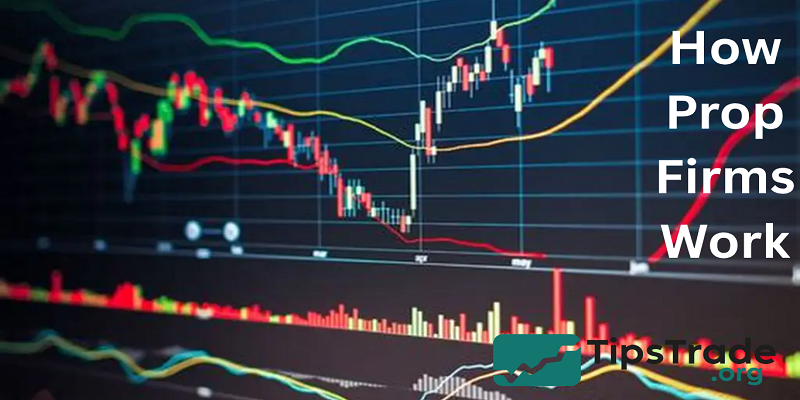Prop firm trading has rapidly evolved into one of the most exciting and accessible pathways for independent traders. Instead of risking their own money, traders can now access large amounts of capital provided by proprietary trading firms—companies that back skilled individuals and share the profits generated. The article above from Tipstrade.org has just provided you . We hope that you find it useful. Wishing you successful trading!
What Is Prop Firm Trading?
Prop firm trading (short for proprietary firm trading) is a system where traders use the company’s funds instead of their own to trade financial markets—such as forex, stocks, commodities, or crypto.
To gain access to this funding, traders must complete an evaluation or challenge, proving they can achieve profit targets while following strict risk management rules.
Once passed, the trader receives a funded account and begins trading real capital. Profits are shared between the trader and the firm according to a pre-set profit split, often 70–90% in favor of the trader.
For example:
- FTMO offers accounts up to $200,000 and allows traders to keep 90% of profits.
- MyForexFunds (before its closure) popularized the two-phase challenge system.
- The Funded Trader and Fidelcrest provide scaling programs, increasing trader capital over time.
In short, prop firm trading allows you to leverage your skill, not your wallet.
Read more:
- Top Prop Firms Offering Best Trading Opportunities Today
- Trading Mindset and Discipline: Secrets of Successful Traders
- Trading Risk Management – Concepts, Techniques & Best Practices
- Prop Firm trend: How It Shapes Modern Trading
How Prop Firms Work

Most prop firms follow a similar structure based on performance evaluation, risk control, and profit sharing.
The Evaluation Phase
The challenge phase is the first step toward becoming a funded trader. You must:
- Reach a profit target (usually 8–10%)
- Stay within maximum daily loss and maximum drawdown limits (typically 5–10%)
- Trade for a minimum number of days (e.g., 10 active days)
- Avoid prohibited practices (holding trades overnight, trading during major news, etc.)
This phase is designed to test your consistency, discipline, and strategy—not luck. If you fail, you can reattempt by purchasing another challenge.
The Verification Phase
After passing the challenge, many firms require a second verification phase with:
- Lower profit targets (around 5%)
- Continued risk control
- Consistent performance
Passing both phases demonstrates that your results are repeatable, not accidental.
The Funded Account
Once verified, you’re given a real funded account. At this stage:
- You trade the firm’s capital under real market conditions.
- You receive profit splits (typically 70–90%).
- Violating drawdown or daily loss limits can result in account termination.
- Firms may offer scaling plans, increasing capital as your performance improves.
This structure rewards consistent, rule-based trading rather than gambling behavior.
Key Benefits of Joining a Prop Firm

Prop firm trading offers multiple advantages over traditional retail trading. Let’s explore the most important ones:
Access to Substantial Capital
- Instead of starting with $1,000 or $5,000, you could trade a $50,000–$200,000 account funded by the firm.
- This gives your strategies room to perform at scale.
Limited Personal Risk
- You don’t risk losing your savings. The only cost is the evaluation fee.Even if you fail, you lose a fraction of what you’d risk trading your own account.
Professional Discipline and Structure
- Prop firms impose clear trading rules, forcing you to adopt institutional-level risk management.
- Over time, this discipline improves your decision-making and consistency.
Growth and Scalability
- Some firms offer “scaling programs,” allowing successful traders to double or triple their capital as they maintain consistent profits over several months.
Community and Support
- Many prop firms build global trader communities, provide analytics dashboards, and offer mentorship programs.
- This support network helps traders learn faster and stay accountable.
| Benefit | Description |
| Access to Capital | Trade large accounts without risking personal money |
| Risk Control | Only the evaluation fee is at stake |
| Skill Development | Improves discipline and consistency |
| Growth Potential | Scale up based on consistent performance |
| Community | Learn from other funded traders |
Potential Risks and Challenges

While prop trading offers opportunities, it’s not a guaranteed path to success. Here are the key risks to understand:
Strict Trading Rules
- Breaking any firm rule—such as exceeding daily loss limits or trading during restricted news events—can result in instant account termination.
High Evaluation Pressure
- Passing a challenge within a limited timeframe can create psychological pressure.
- Even skilled traders may fail due to emotional mistakes or overtrading.
Cost of Repeated Challenges
- If you fail multiple evaluations, the fees can add up quickly.
- Some traders spend hundreds or thousands of dollars before earning a funded account.
Delayed or Conditional Payouts
- Each firm has its payout cycle. Some offer biweekly withdrawals; others only monthly. Make sure the payment structure aligns with your goals.
Psychological Stress
- Trading with strict rules and under evaluation pressure can cause mental fatigue.
- Emotional resilience is just as important as technical skill.
How to Choose a Reliable Prop Firm

Selecting the right prop firm can make or break your trading journey. Consider these essential factors:
Transparency and Reputation
Choose firms that:
- Publish clear terms and conditions
- Have verifiable payout histories
- Are reviewed on platforms like Trustpilot, Reddit, and ForexFactory
Rules That Match Your Trading Style
- If you’re a swing trader, ensure overnight trading is allowed. If you rely on news-based volatility, pick firms without news restrictions.
Profit Split and Payout Frequency
- Higher profit splits sound attractive, but beware of unrealistic promises. 80–90% is excellent; anything above should raise skepticism.
Fees and Refund Policies
- Check for hidden costs like monthly platform fees, scaling costs, or withdrawal charges. Some reputable firms even refund your evaluation fee once you pass.
Trading Conditions and Platforms
- Look for low spreads and fast execution.
- Preferred platforms: MT4, MT5, or cTrader.
- Ensure the firm uses regulated brokers or transparent liquidity providers.
Customer Support
Prompt, responsive support is essential, especially during evaluations or payout disputes.
Pro Tip:
“Choosing the right prop firm isn’t about the biggest payout—it’s about finding a structure that fits your trading style.”
Prop Firm vs. Retail Trading
| Aspect | Prop Firm Trading | Retail Trading |
| Capital | Funded by firm | Self-funded |
| Risk | Limited (only evaluation fee) | Full personal exposure |
| Profit Split | 70–90% for trader | 100%, but limited by small capital |
| Rules | Strict and monitored | Flexible, self-managed |
| Growth | Scalable via firm’s capital | Limited by personal funds |
| Accountability | External oversight | Self-discipline only |
In essence, prop firm trading suits disciplined, consistent traders, while retail trading appeals to those seeking freedom and control over every aspect of their strategy.
Tips to Pass a Prop Firm Challenge

Manage Risk Like a Professional
- Limit daily risk to 1–2% of your account.
- Use proper position sizing and avoid overleveraging.
- Respect the firm’s drawdown limits at all costs.
Focus on Consistency, Not Speed
- Many traders fail because they try to reach targets too quickly. Focus on steady gains rather than “all-in” trades.
Follow Every Rule Exactly
- If a firm prohibits trading during high-impact news events, don’t trade.
- One mistake can void all your progress.
Use Journals and Analytics Tools
- Track every trade using tools like MyFXBook, Edgewonk, or TraderSync. Reviewing your stats helps you spot weaknesses before they cost you.
Practice Before Paying
Simulate challenges on demo accounts. Understand the structure before spending real money.
“The best traders treat evaluations like auditions, not gambling opportunities.”
Effective Strategies for Prop Firm Trading
The right trading strategy can make or break your prop firm success. Choose one that fits the firm’s rules and your personality.
Trend Following / Swing Trading
- Captures large market moves on 4-hour or daily charts.
- Low trade frequency reduces emotional fatigue.
- Works best when holding trades for several days (check if your firm allows overnight positions).
Breakout Trading
- Enters when price breaks major support/resistance levels.
- Effective around major news but riskier due to volatility.
- Not ideal for firms that restrict high-impact event trading.
Scalping / Intraday Trading
- Involves frequent, small trades within the day.
- Requires low spreads, fast execution, and high focus.
- Works best with prop firms that permit frequent entries.
Algorithmic or Automated Trading
- Uses Expert Advisors (EAs) or bots to execute rules-based strategies.
- Some firms restrict automation; check their policy first.
- Ideal for data-driven traders who prefer consistency over emotion.
No single strategy guarantees success — adaptability and discipline matter more than the method itself.
Real-World Challenges Funded Traders Face
Even after passing the evaluation, many funded traders encounter new obstacles:
- Emotional Pressure: Managing large sums of capital can cause hesitation or overconfidence.
- Rule Conflicts: Some firms may change rules or introduce new restrictions unexpectedly.
- Scaling Fatigue: As capital increases, maintaining consistent psychology becomes harder.
- Market Adaptation: Strategies that worked in a bullish market may underperform in consolidation phases.
The key is to approach funded trading as a business, not a get-rich-quick scheme. Professionals focus on long-term sustainability, not short-term profits.
Conclusion
Prop firm trading has democratized professional trading by giving skilled individuals access to institutional-level capital. You no longer need a six-figure account to trade like a professional — you just need a proven edge and the discipline to manage risk. However, it’s not a shortcut to wealth. Most traders fail due to poor psychology, lack of patience, or breaking firm rules. Treat prop trading as a career path, not a lottery. Study, practice, refine your edge, and respect the process.
>>Read more:

